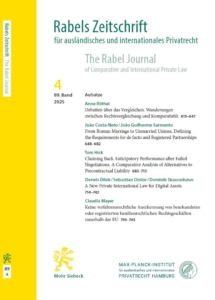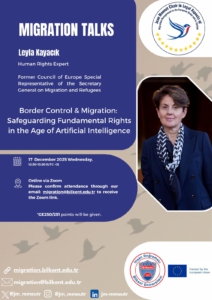The Role of Precedents in Final Appeal Proceedings: Germany, Israel, USA — Panel Discussion (On-Site/Remote), Bonn, 20 January 2026, 6 p.m. German time

The Regional Hubs Bonn, Cologne and Düsseldorf of the German-American Lawyers’ Association (DAJV), together with the German-Israeli Lawyers’ Association (DIJV), the leading law firm Redeker Sellner Dahs and the University of Bonn, invite to a panel discussion at the Bonn offices of Redeker Sellner Dahs.
Germany has recently introduced a “precedent procedure” (“Leitentscheidungsverfahren”) in the German Code of Civil Procedure (“Zivilprozessordnung”, ZPO). The new legislation, only applicable if the outcome is relevant to a “multitude” (“Vielzahl”) of other proceedings, entered into force on 31 October 2024. On that very day, the German Federal Court of Justice (Bundesgerichtshof) immediately made use of this new tool and elevated to a “precedent procedure” a pending litigation against Facebook on damages for immaterial harm from “scraping” according to Article 82 European General Data Protection Regulation (“Scraping Complex”). This was to ensure that the Court be able to deliver an opinion on the relevant question of law even if the parties were to settle the case meanwhile. In the following, the parties did not settle, and the Court delivered its regular judgment soon afterwards, on 18 November 2024. Since then, the Court has not yet used this tool again, as it seems.
Germany is a civil law jurisdiction where, formally speaking (and leaving some exceptions aside), there are no binding precedents. Yet, there has been a long debate on “persuasive precedents”, i.e. the expectation and practice that lower courts follow the judgments of the Federal Court of Justice (and other highest courts), unless they put forward thorough legal reasoning for departing. A plethora of fundamental and practically relevant questions arises in this context: Do judgments of the courts create “law” or do they merely tell us what the law says that the legislator enacted? What, if any, are the constitutional constraints on judicial development of the law? Is the concept of “persuasive precedents” a satisfactory calibration between rendering justice in the individual case and stability of the legal system? What is the status of an opinion of the German Federal Court of Justice in the new precedent procedure in this context? Why does it only cover cases with relevance to a multitude of other proceedings? Is this “multitude” the same as the relevance of the point in law for a “multitude” of cases to grant access to first and final appeal (“fundamental relevance” [“grundsätzliche Bedeutung”])? What is the role of the three layer appeal system in its entirety in this regard? How does the independence of the judiciary come into play and how does this institutional guarantee relate to available disciplinary measures against “slow” and “ineffective” judges? To what extent do judges tend to discipline themselves by following precedents to promote themselves for higher-ranking posts?
All of these questions are highly relevant in other jurisdictions as well, but they are placed in fundamentally different contexts. Israel is a mixed jurisdiction with elements from common law and civil law. How do the Israeli Supreme Court and the lower courts deal with these issues? What is the law-making role of the Supreme Court in the context of constitutional tradition and practice? Is it advisable to combine the function of final appeal with judicial review of the executive and legislative branches of the state? Is there a particular politicization of final appeal proceedings as well, next to this trend in regard to judicial review proceedings? What effect should the role of precedents have on the procedure of appointing judges to the Supreme Court? Similar questions appear with a view to the United States, but there these questions are placed within a common law context. Having regard to recent decisions of the Supreme Court, how binding is precedent, and when can it be overturned? Also, what is the purpose of the “shadow docket”, and what does its apparently increased use signify in current Supreme Court practice? How important is precedent for the rule of law?
These and other questions will be addressed by a distinguished panel that represents the three jurisdictions and diverse perspectives:
Panelists:
Dr Thomas von Plehwe, Attorney admitted to the Bar of the German Federal Court of Justice (“Rechtsanwalt beim Bundesgerichtshof”), Karlsruhe, Germany.
Professor Barak Medina, The Landecker-Ferencz chair in the study of Protection of Minorities and Vulnerable Groups, Hebrew University Jerusalem, Israel.
Professor Russell A. Miller, J.B. Stombock Professor of Law, Washington & Lee School of Law, Lexington, USA.
Moderators:
RA Professor Dr Peter Andreas Brand, Redeker Sellner Dahs Rechtsanwälte, Berlin Offices.
Professor Dr Matthias Weller, Mag.rer.publ., MAE, Director of the Institute for German and International Civil Procedural Law, Regional Board Member for Bonn of the DAJV.
The venue is Willy-Brandt-Allee 11, 53113 Bonn. Participation is possible on site or via video conference.
We are looking forward to seeing you there!
Registration at sekretariat.weller@jura.uni-bonn.de






